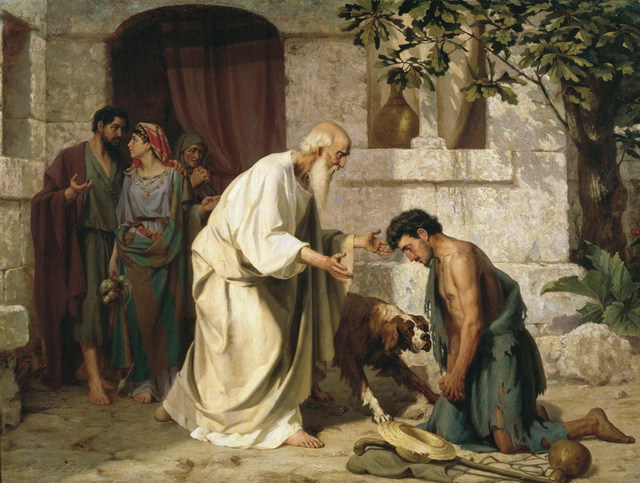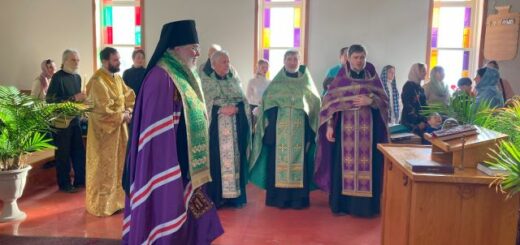Parable of the Prodigal Son

Once again, Christ is surrounded by Pharisees and scribes for whom the exterior takes precedence over the interior (“The Pharisees and the scribes murmured, saying: This man welcomes the wicked and eats at their table [1]»).
The Lord first speaks to them of a lost sheep, for which a man leaves the other ninety-nine. Christ appeals to their mercy, saying that the majority of the sheep (the Pharisees) and the lost sheep (the sinners) are all one flock[2]. When the lost sheep is returned to the fold, then Heaven rejoices [3].
The parable of the lost sheep is followed by the parable of the lost coin. Their meaning boils down to one thing: God loves all of His children – both the “good” ones and the “lost” ones.
These parables apparently remain misunderstood, which is why Christ says directly: “A certain man had two sons” (Lk. 15:11).
The story begins with the youngest, who asks his father for part of the inheritance. It was only possible to contract inheritance rights after the death of parents. In other words, the youngest son wants his father to die as soon as possible. He doesn’t need his father. He is convinced that with the same ease and contentment with which he lived in his father’s house, he will live alone.
“A Certain Man” represents an infinitely merciful and loving God, while the two sons represent two categories of people: the eldest son – the imagined righteous, proud of their constant fulfillment of the outward rituals of the Law of Moses and the traditions of the elders ; the younger son – sinners.
“The inheritance portion” due to both the younger and the older means the image of God impressed upon us at our creation (Gen. 1:27). This image, no matter how hard we try, cannot be destroyed. It remains in us always – for our glory or for our condemnation.
The younger son wastes the divine – paternal – grace which was abundant in the Father’s house. He is deprived of protection and remains alone. He is hungry. Hunger for paternal love, which cannot be replaced by communication (communion) with pigs.
“Then he returned to himself and said to himself, How many of my father’s servants have bread in abundance, and I here am dying of hunger” (Lk. 15:17).
He realizes the depth of his fall. A sincere repentance comes to him, that is to say – the desire to change, to return to his father’s house. His heart fills with purifying tears. He is ready to renounce himself, his “I”, his former life. He decides to take up his cross (repent) and follow the Father, whatever the cost (Mk. 8:34).
“As he was still far away, his father saw him and was moved with compassion. He ran and fell on his neck and kissed him” (Lk. 15:20).
Instead of the expected condemnation, the son is greeted with law and rejoicing, as in the previous parables of the lost sheep and the lost coin.
Sincere repentance and spiritual joy contrast with the malice and anger of the eldest son. Like his brother, he spent all his time outside his father’s house (Lk. 15:25). He had his own idea of service: “I have served you for so many years and never disobeyed you” (Lk. 15:29). He sees the meaning of life in the Father’s house in the external fulfillment of the letter of the commandments, so he sincerely does not understand why the Father did not punish the prodigal son according to this letter of the Law. Instead, the Father responds, “My child, you are with me always, and all that is mine is yours. But it was necessary to celebrate, for your brother was dead, and has come to life, he was lost, and now he is found” (Lk. 15:31-32).
The Father runs towards his two sons. He also loves them, cries and prays for them. On the one hand, the parable speaks of the inexhaustibility of Divine love and, on the other hand, of mutual love [4]. Since this parable was told to the Pharisees and their ilk, Christ, emphasizing the lack of love, says that if we do not love one another, then it would be impossible to know the Father. This is why this is not about the prodigal son, but rather about the prodigal sons. The spiritual paradox is that “it is not good people who enter the Kingdom of Heaven, but repentant sinners [5]».
Saint Ambrose of Milan says this about the meaning of the parable of the prodigal son: “the Gospel commands us to be lenient towards those whose sins have been forgiven after repentance, so that out of jealousy for the forgiveness of others, we ourselves did not lose God’s forgiveness [6]».
[1] Luke. 15:2.
[2] I have yet other sheep which are not of this fold; I must bring them; they will hear My voice, and there will be one flock and one shepherd” (Jn. 10:16).
[3] So, I tell you, there is joy before the angels of God over one sinner who repents. Luke. 15:10.
[4] A new commandment I give you: love one another; as I have loved you, you also love one another. It is by the love you have for one another that everyone will know that you are My disciples (Jn. 13: 34-35).
Even if I distribute all my possessions for the support of the poor, even if I give my body to the fire, if I do not have love, it does me no good (1 Cor. 13: 3).
[5] Archpriest Dimitry Smirnov.
[6] Ambrose of Milan st. Exegesis of the Gospel according to Luke. 7th book. Complete Works. T.8., part 2. Moscow, 2020. Pp. 261-263, paragraph 236.




